If you enjoyed this edition of Voices - please forward to others who may be interested. | |
|
|
|
|
|
|
OF A Marine VETERAN
Jan 2017
|
|
|
|
|
|
Williams, Phil Capt
|
|
| Status |
Service Years |
|
|
|
USMC Veteran
|
1965 - 1977
|
|
|
| MOS |
|
|
1803-Assault Amphibious Vehicle (AAV) Officer
|
|
|
| Primary Unit |
|
|
1976-1977, 1803, Marine Barracks Annapolis, MD
|
|
|
|
|
|
|
|
Record Your own Service Memories
By Completing Your Reflections!
|
|
|
Service Reflections is an easy-to-complete self-interview, located on your TWS Profile Page, which enables you to remember key people and events from your military service and the impact they made on your life.
|
|
|
|

|
|
|
|
| |
| |
|
Please describe who or what influenced your decision to join the Marine Corps?
|
| |
 |
| Parris Island 1965 |
Prior to moving to Georgia from Indiana I had high hopes of attending the United States Naval Academy. I was religious about watching a black and white TV series called "Men of Annapolis" and this was fuel that fed my desire to attend the Naval Academy. However, for various reason that childhood dream quickly faded away as I approached the end of my high school years. During high school in the early 1960's the Vietnam War was not talked about except as a news item. Most of my friends did not know people who were in the military so we were isolated from the reality of what was happening in Southeast Asia.
You would sometimes hear your parents talk about the politics of getting involved but it was not high on casual conversation list of topics. We had lived through the Bay of Pigs invasion fiasco in Cuba and the rise of Castro, the Cuban Missile Crisis with the Soviet Union, and the assassination of President John Kennedy. But a war involving US troops in the far-off land of Vietnam was not on our radar. However, this all changed after I registered for the Draft and saw news reports that the Government had started to draft men out of college for the Army. We watched on TV as the first Draft Numbers were being drawn. My brother (who is 8 years older than I am) had been in the Army in the early 60's and suggested that I avoid the Draft and the Army if possible. When I went off to University of Georgia in the fall of 1964 my thoughts were about being a "college freshman" and being independent. I did enrolled in Air Force ROTC versus Army ROTC and was hoping that would keep the Draft at a distance and me in college, but while I was enjoying my freshman year at UGA - football, parties, friends and oh yes going to class, the Draft was starting to call several people I knew.
I knew that I did not want to go into the Army, but after my Freshman year at Georgia (spring 1965) I really could not decide whether to go back to UGA and take my chances with the Draft or to enlist in one of the other Services. Because I was taking Air Force ROTC at UGA, I was thinking the Air Force might be a possibility. Plus, my uncle had been in the Air Force during WWII, Korea and was still on active duty. However, after much prayer and asking God to give me some direction, He answered my prayers in a very direct but unexpected way. In early August 1965 I was driving around thinking about my 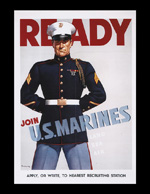 immediate future, seeking some answers and listening for that "small voice" to give me direction. Then it happened, as I approached the City Hall in Decatur, Georgia I saw right there in front of me a very prominent Marine Corps recruiting sign, "Join the Marines". I saw it and had an immediate feeling of peace knowing that God was answering my prayer. immediate future, seeking some answers and listening for that "small voice" to give me direction. Then it happened, as I approached the City Hall in Decatur, Georgia I saw right there in front of me a very prominent Marine Corps recruiting sign, "Join the Marines". I saw it and had an immediate feeling of peace knowing that God was answering my prayer.
In early August 1965 I went to the downtown Atlanta Marine Corps Recruiting Station and talked with the Recruiter about my options. The Recruiter suggested that I stay in school and join the Platoon Leader's Course while at Georgia, but he could not give me any guarantees about the Draft. He said that being drafted was still a possibility. Therefore being 18, I made the decision to not return to UGA for my sophomore year but to go ahead and enlist in the Marine Corps for a three year enlistment. Of course both my parents and my girlfriend were not happy with my decision, but for me I knew that I was doing exactly what God wanted me to do. I was very much at peace with my decision.
When the time came in September 1965 I said my goodbyes at home and had my father drive me to the Marine Corps Recruiting Station in downtown Atlanta across from the Greyhound Bus Station. Several of us were sworn into the United States Marine Corps and also swore to support and defend the Constitution of the United States against all enemies. Then with our orders in hand, the group of new Marine Recruits set off on the "Big Dog" - a Greyhound Bus - for Savannah via Macon where we picked-up a few more Recruits. In Savannah we waited for other new Recruits to arrive, and then together we loaded a bus for MCRD Parris Island. We arrived in the dark and then discovered Drill Instructors. After the Recruits that would be formed into the Platoons of the 180 Series arrived from up and down the East Coast, we were given various tests but finally started the process of being turned into Recruits who would be transformed into Marines.
For me joining the Marine Corps was a decision that changed my life forever. And I cannot over estimate the impact that ALL my Drill Instructors had in creating the new "me". Unknowingly, this decision also opened a door that I thought had been permanently closed several years before, that of attending the United States Naval Academy. My Marine Corps enlistment put me on the path that would also change me as a person physically, mentally and emotionally. Looking back I can say with all honesty that in answering my prayers, God knew that I was not ready for the Naval Academy when I graduated from high school. He knew that I needed to first "grow-up" in many ways, and that the Marine Corps was the tool that would help me do that. I have come to believe through my many life experiences that God's timing is perfect and my enlistment in the Marine Corps in 1965 is just one example of that fact.
|
|
Whether you were in the service for several years or as a career, please describe the direction or path you took. What was your reason for leaving?
|
| |
 |
| 4 July 2015 |
When I enlisted in the Marine Corps in 1965, it was for a three year enlistment. At the time I had planned to do my 3 years, get out and return to college. After Boot Camp at Parris Island however, I saw the world from a different perspective. Going back to college was still my goal but what I would major in I knew had to be given some serious consideration. The Marine Corps showed me that there was more to life as I discovered that life was more than just "enjoying" the college adventure. The Marine Corps assigned me a 1300 MOS, and I was looking forward to going to Camp Pendleton for training as a Combat Engineer. Our Drill Instructors reminded everyone in our Platoon over and over again that we were Riflemen first and part of a team and any additional specially was secondary to be a Rifleman. It was drilled into us that we had better shape-up and function as a team, or we might not survive in combat. At this point in history most, if not all, of the Drill Instructors at Parris Island had not yet been to Vietnam or even in combat of any kind for that matter, but they knew that Marines had to depend on each other in combat for survival. Teamwork and the can-do spirit were essential to achieving success. When we ALL succeeded we were "praised" but when we failed, even if it were one or a few of us, we were ALL punished. "Live together or die together." This was a lesson that became very critical when we reached Vietnam. You had to depend on your fellow Marines in almost everything you did.
That being said after I got settled with the 9th Engineer Battalion at Camp Pendleton in 1965, I started my OJT as a 1345, a heavy equipment operator. My Platoon Commander, Lt. Bob Shoff, was a 1964 Naval Academy graduate, and when he was reviewing my records I assume he saw that I had attended a year of college. He asked me why only a year, and I told him I joined the Marines to avoid the Draft. He then asked me if I was interested in staying in the Marine Corps and if I would be interested in applying for a college / officer program. Up to that time I was only interested in surviving and learning what I could as a 1345. My "educational" interests were centered around taking the appropriate MCI courses. Trying to keep up with the mandatory MCI Course was a challenge with all of the distractions including those offered by being in California for the first time and going on liberty. But after some conversations with him, I decided that I did want to stay in the Marine Corps if I could get into a PLC or NROTC program. With Lt. Shoff's help, I started the investigative process of approaching several colleges about their NROTC programs. Finally, I settled on a program at Holy Cross but I was told by Personnel that because I was currently on active duty I was not eligible for NROTC programs. Then the Naval Academy published a "recruiting" article in the "Marine Corps Times" about the Naval Academy Prep School (NAPS) as a path to the 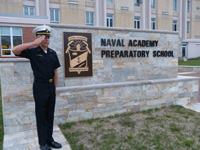 Naval Academy via a Secretary of the Navy appointment. This article was soon followed by an article from Headquarters Marine Corps about the requirements for enlisted Marines to apply to the NAPS program. It appeared I was qualified to apply for the NAPS Program. Naval Academy via a Secretary of the Navy appointment. This article was soon followed by an article from Headquarters Marine Corps about the requirements for enlisted Marines to apply to the NAPS program. It appeared I was qualified to apply for the NAPS Program.
But while I was interested in the NAPS program I had other priorities that were more pressing at the time. D Company, 9th Engineer Battalion was doing additional training for a field deployment to Vietnam. One of my added duties was that of being one of our Platoon's 4 grenadiers which sent me to the field a few extra times. In addition, we were making preparation to board the USS Ogden in San Diego for our trip to Vietnam. Therefore, I was busy and had other responsibilities to take care of...stencil equipment, pack equipment and supplies and do additional training. In the meantime, my Platoon Commander continued to encourage me and helped me submit the proper paper work for NAPS, and he wrote me a recommendation before we set sail from San Diego for Vietnam.
Then after we landed in Vietnam, doing my job and surviving as a PFC were again at the forefront of my priority list. However, several weeks after we landed at Chu Lai, I was called to the Company Office (tent) and asked to take a PSAT test to be turned into the NAPS Review Board. Needless to say at that point in time because we were still working in the sand and living in tents, I was not emotionally or academically thinking about a PSAT test. But after taking the test, I was certain I had ended any NAPS possibility for this year (1966). I was certain that I would have to re-enlist (to have at least 2 year in my enlistment left) in order to be eligible for applying for the NAPS Class of 1968. But I literally forgot about NAPS at that point and concentrated on my equipment and the work we were doing. Then in early August 1966, I received notification that I had been accepted into the NAPS program. The situation at that time was that I could accept or turn down these orders. I accepted the orders and then went back to work and waited. Shortly thereafter I was called back to Company Headquarters at Chu Lai from the Outpost where I was working which was south of Tam Ky and was told to pack and given orders to NAPS. I was ordered to report to the Commanding Officer of the Naval Training Center, Bainbridge, MD. To say the least I was shocked when both my acceptance and my orders arrived. I had thought that "ship" had sailed when we pulled out of San Diego and headed to Vietnam. My experiences while I was part of the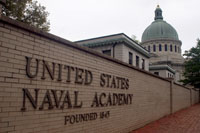 9th Engineer Bn pointed out to me how important it is to keeping your eyes open for opportunities to help others. As a new 1345 I had more "seasoned" Marines show me the ropes about being a 1345 and teach me about the various pieces of equipment I was assigned to. But also, what Lt. Shoff did for me and the extra effort he put forth were part of his internal character. He was not expected to take that kind of interest in keeping this Private he did not know in the Marine Corps, but somehow he was led to take me "under his wing" and for that display of thoughtfulness I am forever grateful. In the grand scheme of my childhood dream of attending the Naval Academy, I see Lt. Shoff as one of God's angels who was put in my life to help move me along this section of my journey. I would hope that I would be put in someone's life to help them along life's path. 9th Engineer Bn pointed out to me how important it is to keeping your eyes open for opportunities to help others. As a new 1345 I had more "seasoned" Marines show me the ropes about being a 1345 and teach me about the various pieces of equipment I was assigned to. But also, what Lt. Shoff did for me and the extra effort he put forth were part of his internal character. He was not expected to take that kind of interest in keeping this Private he did not know in the Marine Corps, but somehow he was led to take me "under his wing" and for that display of thoughtfulness I am forever grateful. In the grand scheme of my childhood dream of attending the Naval Academy, I see Lt. Shoff as one of God's angels who was put in my life to help move me along this section of my journey. I would hope that I would be put in someone's life to help them along life's path.
When I graduated from NAPS in 1967 I received one of the 85 regular Navy/Marine Corps Secretary of the Navy Appointments to the United States Naval Academy. Upon graduation from USNA in June 1971, I went back "home" to the Marine Corps. When I completed The Basic School (TBS) at Quantico, VA I was assigned an 1803 MOS (Amphibian Tractor Officer). This MOS led me and my wife to Hawaii for a 3 year tour with D Company, 3rd Amphibian Tractor Battalion, 1st Marine Brigade and then to Camp Schwab, Okinawa with the B Company, 1st Amtrac Bn for a 13 month unaccompanied tour. As a side note one of my Drill Instructors, Sgt J. M. Avery was killed in 1968 in Vietnam, and he was an Amtracer.
Fast forward to 1976 and my last duty station which was Marine Barracks, Annapolis where I was assigned as an Instructor at the U. S. Naval Academy. In February 1977, I was diagnosed with Type I Diabetes and eventually received a Medical Discharge from the Marine Corps when I was a Captain. After I received my commission and prior to my Diabetes, I had decided to make the Marine Corps my long-term career. I therefore tried for several months to convince the Marine Corps (and the Navy's Physical Evaluation Board - PEB) to let me stay on active duty. But deep down I knew that ALL Marines from the bottom up are first and foremost Riflemen and being a Type I diabetic versus a Type II can have serious implications.
 In August 1977 my discharge was finalized. Of course it was not until others had filed a lawsuit in the 1990's that the U.S. Government recognized Agent Orange as a toxic chemical and started compensating Veterans from the Vietnam War era. In 2012 I returned to the VA for a re-evaluation of the cause of my physical issues. After several interviews, tests and examinations in 2012-13 the VA finally classified my Diabetes and subsequent open heart by-pass surgery as a result of Agent Orange exposure while I was "playing in the dirt" in Vietnam. In August 1977 my discharge was finalized. Of course it was not until others had filed a lawsuit in the 1990's that the U.S. Government recognized Agent Orange as a toxic chemical and started compensating Veterans from the Vietnam War era. In 2012 I returned to the VA for a re-evaluation of the cause of my physical issues. After several interviews, tests and examinations in 2012-13 the VA finally classified my Diabetes and subsequent open heart by-pass surgery as a result of Agent Orange exposure while I was "playing in the dirt" in Vietnam.
When I was evaluated for my diabetes in 1977 the Doctor's evaluation did not specify a cause of my diabetes, and except for losing weight as my diabetes developed I seemed to be very healthy. When I graduated from Parris Island in 1965 I weighed in at 160+ lbs. When I graduated from the Naval Academy in 1971 and was issued my Dress Blues, I weighed in at 160+ lbs. Before I developed Diabetes in 1977 when I was a Marine Corps Captain I weighed 160+ lbs., and today (2015) 44 years later, I still weigh 160+ lbs. Plus, I can still get into my original Dress Blues. However, I will admit that I have been as high as 170 lbs.
|
|
If you participated in any military operations, including combat, humanitarian and peacekeeping operations, please describe those which were the most significant to you and, if life-changing, in what way.
|
| |
 |
| Building the Battalion Home Base |
Not having been in a combat zone before, it was very unnerving to be anchored off of Chu Lai and making preparation for a predawn landing in a "combat zone" in 1966. On top of that we were ordered to NOT have our magazines loaded or else (See Battalion Commander's Ammunition Orders). Being a PFC I was not being updated on the situation but was just being told to follow orders. It would have helped everyone's nerves to know that we were landing on a very secure beach area at the Chu Lai Marine Corps Air Station. When the sun came up that first morning we saw Marines driving and walking by our beach position and you knew they were laughing at us. We were decked out in helmets, flack jackets, etc. and eating the best breakfast a C-rats box could offer.
Of course the Marines passing by our beach location looked like they were outside the Camp Pendleton PX, soft covers, no flack jackets, etc. After we moved outside the Chu Lai base's front gate, across Route 1 and the RR tracks, things turned more into a combat environment. We could periodically hear gunfire in the distance, especially at night. We could also see the flashes from the B-52 bombing runs far off in the mountains. We were moved to a large open area of white sand and very little vegetation. We were spread out by our Platoon Sergeant and dug our fox holes that first day/night. It was here the 9th Engineer Battalion would build its HQ. As we were unloading and transporting our equipment and supplies from the USS Ogden, the tent city started to take shape, but we slept in our fox holes for several nights. After several tents were set up for the CO and the admin staffs, and the Maintenance section, the 1371 carpenters started building the wooden frames for the canvas tents.
After the USS Ogden had been unloaded and the base camp established, we were sent out for small jobs to begin with and to learn the lay of the land. There was a Vietnamese village just north of our location, and we were allowed to visit and buy trinkets to send / take home. The more comfortable life became, we were allowed to start having Vietnamese women do our laundry. For me this lasted only a few weeks and then I moved to an Outpost north of Chu Lai but south of Tam Ky where I stayed most of the time. I moved dirt and loaded dump trucks for 2-hours and then rode shot-gun in a dump truck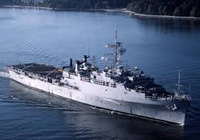 for 2-hours to deliver dirt out to the road construction site. I broke for lunch and then repeated that exercise in the afternoon. At night I was on a rotating bunker watch which was on top of a hill overlooking the Outpost compound. Most of the time it was quiet, but at times we would receive sniper fire from a underbrush. We figured we had too much fire-power at our location for a serious attack. Besides the Engineers, we had Infantry, Recon, Tanks and 8" self-propelled howitzers. It was a busy Outpost. for 2-hours to deliver dirt out to the road construction site. I broke for lunch and then repeated that exercise in the afternoon. At night I was on a rotating bunker watch which was on top of a hill overlooking the Outpost compound. Most of the time it was quiet, but at times we would receive sniper fire from a underbrush. We figured we had too much fire-power at our location for a serious attack. Besides the Engineers, we had Infantry, Recon, Tanks and 8" self-propelled howitzers. It was a busy Outpost.
One thing you learn to do in a combat zone is to barter, whether for your favorite C-Rats meal or for a spare part for your equipment. The art of negotiation was an important skill to work-on and develop. The "you scratch my back, and I will scratch yours" was a valuable virtue. You never cheated someone or you would pay dearly. Back at the Battalion's Main Camp I often heard the maintenance folks talk about deals they made with the Sea Bees for parts, movies, beer, etc. It wasn't the Ritz but it was the jungle either.
|
|
Of all your duty stations or assignments, which one do you have fondest memories of and why? Which one was your least favorite?
|
| |
 |
| B Co. 1st Amtrac Bn - Okinawa |
After graduating from The Basic School (TBS) and being assigned an 1803 MOS (Amphibian Tractor Officer) the Marine Corps gave me orders for a 3-year accompanied tour at Kaneohe Marine Corps Air Station (KMCAS) in Hawaii with D Company, 3rd Amphibian Tractor Battalion, First Marine Brigade. The first time I was in Hawaii was in 1966 when the USS Ogden docked at Pearl Harbor while transporting the 9th Engineer Bn to Vietnam. To say the least, this was a terrific duty station. I was assigned as the 2nd Platoon Commander, and we had 10 LVTP-5. I had first seen an LVTP-5 in Vietnam after it was towed to the Outpost. It was a heap of un-usable steel and I became familiar with the damage a mine could do to this gasoline powered troop carrier.
For reference just know that the LVTP-5 was built from steel and had 12 rubber bladders of gasoline under the vehicles floor plates in the troop compartment. In Vietnam a mine would turn these steel monsters into a flaming death trap. So in Vietnam the infantry learned quickly not to ride inside the troop compartment. Instead of riding inside they would build sandbag bunkers on the top of the amtracs. The new LVTP-7 is built from an aluminum based alloy and came out in the early 1970's. It uses diesel fuel with the fuel tank on the side of the vehicle. In addition, the hull would absorb small arms fire
When D Company was getting ready to receive the LVTP-7, I was sent to California for training with the P-7. After serving 2 years as the LVT 2nd Platoon Commander, I had to move aside for an incoming 2nd Lieutenant assigned to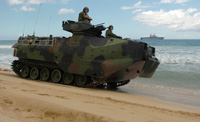 D Company. Fortunately for me instead of being moved to another unit on Base to finish out my tour, I became the Supply Officer for D Company which gave me some good budgeting experience for later in my career. While in Hawaii I was also able to attend the University of Southern California Master's degree program and received a Master of Science in System Management (MSSM) before the end of my tour. D Company. Fortunately for me instead of being moved to another unit on Base to finish out my tour, I became the Supply Officer for D Company which gave me some good budgeting experience for later in my career. While in Hawaii I was also able to attend the University of Southern California Master's degree program and received a Master of Science in System Management (MSSM) before the end of my tour.
For the last 2 years of my tour, my wife and I lived in Base Housing which was interesting. It was single-wall wooden construction with no sheet rock walls on the inside. One side of the wood walls were the inside of the house and the other side of the same wood wall was the outside. If you stepped out of the shower you wanted to make sure you didn't lean too hard against the wall or you might find yourself in your yard wearing nothing but your "birthday suit".
One of the more interesting things which happened was on 6 October 1973 when Egypt and Syria launched a joint attack on Israel resulting in the Yom Kippur War. The U.S. became concerned about the 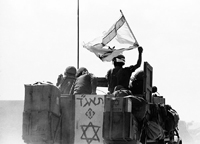 Soviet Union intervening, and on 25 October U.S. forces, including Strategic Air Command, Continental Air Defense Command, European Command and the Sixth Fleet, were placed at DEFCON 3. Everyone had to report in and be accounted for. Then because the US supported Israel, the Arab countries in the Persian Gulf area cut-off oil shipments to the US. However, it was about 6-weeks before the Persian Gulf countries realized that Hawaii was part of the US. Hawaii has its own refineries and received its oil directly from the Persian Gulf. Of course when they discovered their error Hawaii got cut-off too. Soviet Union intervening, and on 25 October U.S. forces, including Strategic Air Command, Continental Air Defense Command, European Command and the Sixth Fleet, were placed at DEFCON 3. Everyone had to report in and be accounted for. Then because the US supported Israel, the Arab countries in the Persian Gulf area cut-off oil shipments to the US. However, it was about 6-weeks before the Persian Gulf countries realized that Hawaii was part of the US. Hawaii has its own refineries and received its oil directly from the Persian Gulf. Of course when they discovered their error Hawaii got cut-off too.
After enjoying the wonders and the life of living in Hawaii, the Marine Corps provided me with "payback" orders for a 13 months unaccompanied tour as the XO of B Company, 1st Amphibian Tractor Battalion at Camp Schwab, Okinawa.
Having been on Okinawa only once which was when I left Vietnam and passed through Kadena Air Base and Camp Hansen in 1966, I found it now to be very commercialized. When I was there in 1966 on my way to NAPS my uncle was an Air Force Colonel stationed with his family at Kadena AFB. I called him after we got settled at Camp Hansen to say hi, but he invited me to stay with his family. He made a few calls and sent a car to pick me up. While I enjoyed the "comforts of home" I paid dearly when I got back to Camp Hansen to prepare to leave. Being a PFC, I was not suppose to have such privileges. But for that brief moment in time it was worth it.
When I arrived at Camp Schwab I was assigned as the XO of B Company, 1st Amtrac Battalion. I was XO for about 10 months and truly enjoyed the experiences I had. I was also able to take liberty and travel to Naha and tour some of the Japanese military emplacements and caves from the WWII period. Being a history buff made this a very interesting duty station.
Then I was assigned the duty as the Headquarters Commandant for a III MAF Tactical Exercise Control Group - TECG (war game umpires) for two exercises. The first exercise was held in the Zambales area of the Philippines on the north side of Subic Bay. This was MAULEX 3-76 with the Filipino Marines and BLT 1/9 of the United States Marines. 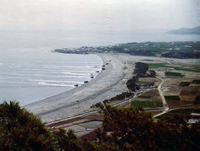 The second exercise was called MAULEX 2-76 (PHIBLEX 75-8 Korean exercise) in Po Hang, South Korea with BLT 2/4 of the United States Marines and the Republic of Korea Marines. With this job we moved first to Subic Bay Naval Station in the Philippines to organize and train. Being in the Philippines for the first time was an experience. I took advantage of traveling to Manila and learning some of their history. I visited Rizal Park and Fort Santiago and tried to visualize how combat in that environment would have been like against an organized Japanese military force that was ruthless versus the guerrilla combat in Vietnam. The second exercise was called MAULEX 2-76 (PHIBLEX 75-8 Korean exercise) in Po Hang, South Korea with BLT 2/4 of the United States Marines and the Republic of Korea Marines. With this job we moved first to Subic Bay Naval Station in the Philippines to organize and train. Being in the Philippines for the first time was an experience. I took advantage of traveling to Manila and learning some of their history. I visited Rizal Park and Fort Santiago and tried to visualize how combat in that environment would have been like against an organized Japanese military force that was ruthless versus the guerrilla combat in Vietnam.
After completing MAULEX 3-76 we packed our equipment and moved back to the Subic Bay Naval Station to re-organize and replenish. We then flew to Taegu Air Base in South Korea and unloaded our gear for transport to Po Hang on the coast for the MAULEX 2-76 war games. Po Hang was the Headquarters for the ROK Marine Corps. It was cold, rainy and a little snowy, plus we had a muddy camp site to live in. So it was an experience to remember, but not one you would set out to repeat. But we did our job, and I believe the exercises were classified successes by all sides.
The very worse time however was when the TECG officers along with several other Marine Officers from the Infantry were invited to a "party" given by the senior South Korean Commander. The camaraderie was great, but the snacks included boiled insects and Kimchee which were not part of my meal plan. I tried one of the protein treats and some of the Kimchee but after that I was being a social conversationalist who did not have time to snack or drink. One of my roommates at the Naval Academy was from the South Korean Naval Academy who loved Kimchee so I knew what was coming my way. And worked up my regrets before being offered seconds.
|
|
From your entire service, including combat, describe the personal memories which have impacted you most?
|
| |
 |
| Me & Ken Van Gilson |
It may be unusual to say, but making it through Parris Island and earning the title of Marine has impacted me the most. This experience helped me "grow-up" physically (from 135 lbs. to 160 lbs.), mentally and emotionally. I did not play sports in high school and being only 5' 8" I was not the football type. However, I was athletic in my capabilities, so I was able to adjust and hang-in there during Boot Camp. But Boot Camp also showed me that I can do the "impossible"...if I can develop the right attitudes, "where there is a will there is a way" and a "can do" spirit.
Another experience was the impact that my 9th Engineer Battalion Platoon Commander (Lt. Shoff) had on me. Besides caring about my future and helping me achieve a childhood dream (attending the U.S. Naval Academy), he took steps that helped direct my future. His actions have helped me to always look for what I might do to help others. In many cases I am able to do work through my church to help those who need help, whether it is physical or emotional. But also while I worked for Georgia State University and the University System of Georgia I saw that helping others and not expecting something in return offers you a terrific feeling of accomplishment.
At Parris Island my D.I.s taught me the importance of teamwork and brotherhood. Their efforts cannot be given enough importance. While in Vietnam I learned how important it was to know who you could count on when the time came. Marines in a specific unit often become very dependent upon each other and develop an unspoken bond. I have discovered that Enlisted Marines develop a closer relationship with each other than Officers. Marine Officers establish friendships with other Officers, but Enlisted Marines develop a brotherhood type relationship. The phrase "once a Marine always a Marine" makes Marines different from all of the other services.
General James F. Amos, Commandant of the Marine Corps 2010-2014, is quoted as saying: "A Marine is a Marine. I set that policy two weeks ago, there's no such thing as a former Marine. You're a Marine, just in a different uniform and you're in a different phase of your life. But you'll always be a Marine because you went to Parris Island, San Diego or the hills of Quantico. There's no such thing as a former Marine."
|
|
What achievement(s) are you most proud of from your military career? If you received any medals, awards, formal presentations or qualification badges for significant achievement or valor, please describe how these were earned.
|
| |
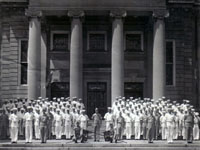 |
| NAPS Class of 1967 |
As mentioned earlier I am most proud of graduating from Parris Island and earning the title of Marine. And I often see other Marines whom I do not know, and we often exchange a "Semper Fi" or a Birthday greeting when it is near 10 November. The Marines are truly a "band of brothers" (male and female).
Another event that is very important to me was when I received a Secretary of the Navy appointment to the United States Naval Academy after graduating from the Naval Academy Prep School (NAPS). As my time at NAPS came to a close I was competing for one of the 85 Appointments being given to active duty Navy and Marine Corps personnel by the Secretary of the Navy. To coin an old phrase, "I am not the sharpest knife in the drawer," but I did work hard, and it paid off.
Receiving a Secretary of the Navy appointment is closely followed by my graduation from the United States Naval Academy on 9 June 1971 and returning "home" to the Marine Corps as a 2nd Lieutenant. Once again, the academics at the Academy were difficult for me. Thanks to Admiral Calvert, the Naval Academy Superintendent when the Class of 1971 graduated, our academic program went through an overhaul where everyone had to have major. With the Naval Academy awarding only a Bachelor of Science degree my struggles with the engineering and math courses sent me into prayer many times. But with the new academic major rules, I was able to have a "bull" major instead of an engineering or math major. Therefore I graduated with a BS degree but a major in International Affairs.
|
|
Of all the medals, awards, formal presentations and qualification badges you received, or any other memorabilia, please describe those which are the most meaningful to you and why?
|
| |
 |
| USS Bang at periscope depth - 1969 |
As mentioned earlier, competing for and obtaining one of the 85 Secretary of the Navy Appointments to the US Naval Academy for regular Navy / Marine Corps personnel was very meaningful. This represented a dream come true for me that started when I was a child in the mid-fifties. Graduating from the Naval Academy was the fulfillment of that childhood dream. When I graduated from high school in 1964 I knew that my hope of attending the Naval Academy had been lost. When I returned to the Marine Corps, it was returning to an organization and life that I had grown to truly enjoy and love. With my wife's support, my Marine career was moving in a positive direction.
The following two items represent the first time that I was on a submarine and experienced a "dive"'. This experience happened on both a diesel and a nuclear submarine: A) While at the Naval Academy with the rank of Midshipman I was able to be inducted into the "New Order of Guppy Snorkelers" while aboard the USS Bang (SS 385). On 24 July 1969 while in the Chesapeake Bay area I earned the title of "Snorkel Master" having submerged into the depths of the "aquatic domain." B) Also on 24 July 1969, I became an honorary member of the crew of the USS Haddo (SSN 604) as well as an honorary nuclear submariner having performed beneath the depths of the "aquatic domain".
|
|
Which individual(s) from your time in the military stand out as having the most positive impact on you and why?
|
| |
 |
| Drill Instructors - Platoon 183 |
When a person graduates from the Marine Corps Recruit Depot at Parris Island and earns the title of Marine, it has to have a positive impact on them for the rest of their life. For me when I have been asked about the personnel who provided the leadership at The Basic School (TBS) at Quantico, VA I am often at a loss. But when I am asked about my Drill Instructors at Parris Island, their names are front and center in my mind. I was in Platoon 183, D Company, and we lived in the white, wooden 2-story WWII Barracks across from the Parade Deck. My Drill Instructors were: Sgt. F. S. Knight (Senior DI); Sgt. J. M. Avery (Junior DI); Sgt. J. D. Bishop (Junior DI - replaced Sgt. Goodnight); Sgt. Goodnight (Junior DI - left detail early); These four Marines pounded into every member of our Platoon what it would mean to earn the title of MARINE.
While I was with D Company, 9th Engineer Battalion, my Platoon Commander was Lt. Shoff. He was very influential in my life because of his efforts to help me eventually get to the United States Naval Academy. It was not exactly a straight path, but he helped guide me as far as he could while I was under his command.
My last duty station was at Marine Barracks Annapolis where I was assigned as an Instructor at the Naval Academy. My boss at that time, who was the Head of the Management Department, was Major Walt Boomer who in 1992 became the Assistant Commandant of the Marine Corps. He was very supportive following my diagnosis with Type 1 Diabetes which led to my Medical Discharge from the Marine Corps.
|
|
Please recount the names of friends you served with, at which location, and what you remember most about them. Indicate those you are already in touch with and those you would like to make contact with.
|
| |
 |
| USNA 28th Company - Class of 1971 |
Parris Island: The "terrors" of Boot Camp and your Drill Instructors cause you to create a unique band of brothers whose goal is survival. In many cases after PI we went our separate ways but while at PI we learned to help and depend on each other.
9th Engineer Battalion: 10 of my Series from Parris Island were given orders to the 9th Engineer Battalion with a 1300 MOS for on-the-job training. We were the "newbies" and once again banded together for survival when the those engineers who already had their qualifications moved into the barracks.
NAPS: When I arrived at NAPS I did not know anyone. My roommate, Bill Barasha, was from Pottsville, PA and had been recruited to play football for Navy. He had gone through Navy Boot Camp at Great Lakes, IL and was in the Navy Reserves competing for one of the Reserve Appointments (which he received). Of the other Marines, Bill Carter, Greg Kendal, John Condon and John Kellogg are the ones I remember the best. I saw Bill Carter later in Okinawa.
Naval Academy: Like with Boot Camp you learn that survival is based on group associations and support. As Plebes at USNA, I was the only one in my Company from the Fleet and also one of the older Plebes. Because I had been through Parris Island, Plebe year while trying and long was not something I knew I would have trouble completing. But our Class did support each other although there were several groups which became islands within the larger group which is natural - "birds of a feather flock together". I have stayed in contact with my Naval Academy Class more than any other group.
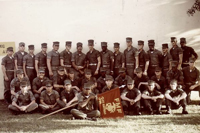 3rd Amtrac Battalion: Being stationed at Kaneohe with D Company, 3rd Amtracs was my first duty station as an officer. As I stated earlier Sgt Herron, my Platoon Sgt, helped me in more ways than I can count making the transition from an Enlisted Marine to a Marine Officer. In addition, Jim Hawkins (a Platoon Commander) and Major Slovak (my CO) were friends I could count on professionally and personally. 3rd Amtrac Battalion: Being stationed at Kaneohe with D Company, 3rd Amtracs was my first duty station as an officer. As I stated earlier Sgt Herron, my Platoon Sgt, helped me in more ways than I can count making the transition from an Enlisted Marine to a Marine Officer. In addition, Jim Hawkins (a Platoon Commander) and Major Slovak (my CO) were friends I could count on professionally and personally.
1st Amtrac Battalion: Being the XO of an Amtrac Company was an interesting position. It was being friends with but not close to the other officers. Bill Carter from NAPS was also stationed at Camp Schwab while I was there. As you went up in the command structure that seemed to be the case. However, while I was the Headquarters Commandant for the TECG it was a different environment. My responsibilities were with coordination, transportation and training. Wit h that in mind we all seemed to get along fine and enjoyed the experience. Lt Usher, Sup[ply Officer, and I toured Manila together and he retired as a General. The NFO on the staff was a jokster all ofm the time - Major Berdine. It was a close group when we were together but then when the TECG was dissolved we went our separate ways.
Marine Barracks Annapolis: When I checked in at Marine Barracks Annapolis I found out that I was assigned to be an Instructor at the Naval Academy as opposed to a Company Officer. When I checked in at the Naval Academy I was assigned to the Management Department. Fortunately for the Management Department was headed by Major Walt Boomer, USMC. He was a terrific person to work for and after I came down with diabetes, he was more than helpful helping me try to stay on active duty for a longer evaluation period, mainly completing my 3 year tour at Marine Barracks Annapolis.
|
|
Can you recount a particular incident from your service which may or may not have been funny at the time, but still makes you laugh?
|
| |
 |
| No need to lock & load here. |
When we landed at Chu Lai, we were brought ashore before sunrise onto a dark beach. We "knew" we were going into a "hostile environment," but it seemed very strange that we were ordered to keep our magazines out of our weapons. When the sun rose that morning we saw that the beach on which we were unloaded was part of the Chu Lai Marine Air Base complex. As we sat and ate our breakfast C-Rats, the base began to come alive. We were wearing our helmets and flack-jackets and our M-14's were close by our sides, but the Marines walking by us, and I am sure there were laughing at us, wore utilities, soft covers and several did not carry their weapons. It sort of made you feel foolish, but it did not take long for everyone to laugh about that episode.
|
|
What profession did you follow after your military service and what are you doing now? If you are currently serving, what is your present occupational specialty?
|
| |
 |
| Official GSU Photo -2007 |
Following my Medical Discharge in Annapolis, MD, I started looking for a job in the civilian world by attending various job fairs in the Washington-Baltimore area hoping to find a job near Annapolis. However, there were not many jobs available for an Amphibian Tractor Officer and many of those attending these job fairs were former military personnel.
After a month of being turned down over and over because of "lack of experience," my wife and I decided that I should try the Atlanta job market where she already had a job offer to return to Trust Company of Georgia (now SunTrust Banks). After attending a job fair in Atlanta and sending out my resume to several companies, I was starting to get discouraged. However, I did have some contacts via our church in Atlanta who worked at Lockheed in Marietta, GA. My initial interviews at Lockheed were in the Finance Department, but my background did not lend to me working in that area.
Next on the job interview "merry-go-round" was an interview with head of Lockheed's Internal Auditing Department. They liked my resume, except I did not have any background in that area. As sometimes happens, the folks I interviewed with did provide me with a contact at Georgia State University (GSU). While they did not know of any specific job openings they believed that if there were openings, I might be able to get by that often required specification for an entry-level position, "2-years" of experience.
After interviewing with the Head of Employment Services at GSU I was given interviews with 2 GSU Departments, the Department of Education and the Department of Information Systems. The Department of Education interview went very well, and I was sure that they had a position I would fit into. The Department of Information Systems was not an initial success. I eventually talked with the Chairman of the Department who had attended the Naval Academy for 2 years, I saw that as a plus. However, he did not have available positions that I had experience for, but, earlier that year one of his professors had been appointed the Director of the Georgia State University Computer Center. 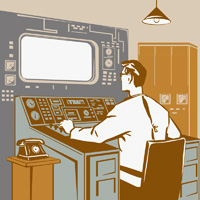 He setup an interview for me and "the rest is history" as they say. The Computer Center Director had a new position available for an entry level COBOL programmer that had not been posted yet. All I remembered about computers was keypunching those "stupid" 80-column cards for my Fortran class. At the time of my interview I did not even know what COBOL was. But I told him that I could handle it if they would give me a chance. He setup an interview for me and "the rest is history" as they say. The Computer Center Director had a new position available for an entry level COBOL programmer that had not been posted yet. All I remembered about computers was keypunching those "stupid" 80-column cards for my Fortran class. At the time of my interview I did not even know what COBOL was. But I told him that I could handle it if they would give me a chance.
I left Georgia State not knowing what the future would hold, but felt I had a good opportunity to get a job. My preference was to work in the Computer Center. After a few weeks I received a job offer from the Department of Education. But before accepting it I called the Computer Center and talked with the Department Manager who had the open position. I told I had a job offer, but also told him of my preference to work for the Computer Center. The next day I received a verbal offer from the Computer Center to start on 1 November 1977 as an entry level COBOL programmer. My next task was to get some books and learn COBOL.
I started my new job at Georgia State University in 1977 and retired in 2008 as the Head of the Department that I had originally joined. In addition, starting in 1996 I had a duel job of managing hardware and software environments for the University System of Georgia's automated library system, Endeavor's Voyager. My title at GSU was Directory of Library Services Support and my title for USG was the Director of Virtual Library Support.
Needless to say, none of my Marine Corps MOS's had any direct correlation to my job in the computer field. But my Marine Corps experiences made all the difference in the world with how I viewed and executed my various responsibilities.
|
|
What military associations are you a member of, if any? What specific benefits do you derive from your memberships?
|
| |
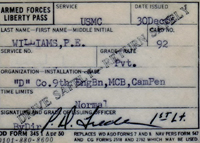 |
| D Co. 9th Eng Bn Liberty Card Card #92 |
9th Engineer Battalion Association, Chu Lai Association with former members of the 9th Engineer Battalion. When I joined the 9th Engineer Bn in Dec 1965, it was just being re-activated. My Liberty Card was #92 in D Company.
Military.com; Various discounts such as Military Tee Time and Vacation discounts.
VetFiends.com: An association of military personnel from all services and with a variety to statuses. Military items are sold at a discount, plus other support links. Also contacts directories are available to search for friends. VetFriends.com like Military.com has given me access to information and resources that I did not know existed.
RallyPoint.com: A discussion list for military personnel. I have contacted others who were in my MOS. Plus I have been able to get involved in various topics that would be of interest to military personnel.
United States Naval Institute: Keep current with affairs involving both the Navy and the Marine Corps.
USAA: Insurance for military and their families.
|
|
In what ways has serving in the military influenced the way you have approached your life and your career?
|
| |
 |
| Library Service Support Award from the Georgia Library Association |
Life should be looked at as a "can-do" environment that offers you daily challenges that can be used to help you improve yourself and to work on helping others. When I started working at Georgia State University I used what the Marine Corps had taught me while I was an Enlisted Marine as well as when I was an Officer. As a Department Manager I had to deal with both personnel and organizational situations. The phrase "where there is a will there is a way", offered me many opportunities to search for, discover and use various "ways" that I found.
Later as the Director of Virtual Library Support for the University System of Georgia (USG) I worked with many people (mostly Librarians) in the USG who had that same "can-do" spirit and one outcome of that cooperative "can-do" spirit was what is know in Georgia as GIL - Georgia Interconnected Libraries.
|
|
Based on your own experiences, what advice would you give to those who have recently joined the Marine Corps?
|
| |
 |
| Salmon fishing in Alaska on family vacation |
Make the effort to learn from your experiences, the good, the bad and the ugly, and get as much education as you can in support of your MOS(s). In addition, if time permits explore ways to increase your non-military education through technical or college courses. Do not let idol time be wasted on non-productive exercises. Enjoy your liberty and party wisely if you are single. Also, if you are married spend time with your family and be as involved with their lives as possible. Deployments are rough on families. Make friends with other families for those times when you are not available there is a support group for them.
|
|
In what ways has TogetherWeServed.com helped you remember your military service and the friends you served with.
|
| |
|
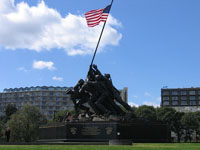 In filling out the answers to these questions I have looked back and remembered various experiences and people that have crossed my path. I have never written down so much about my time and experiences while I was on active duty in the Marine Corps. With that being said, our son (who is now 31) knows very little about my time as an active duty Marine. After I finish the initial parts of TWS, I plan to make it available to him so he can read about and see what his Dad did before he was born. In filling out the answers to these questions I have looked back and remembered various experiences and people that have crossed my path. I have never written down so much about my time and experiences while I was on active duty in the Marine Corps. With that being said, our son (who is now 31) knows very little about my time as an active duty Marine. After I finish the initial parts of TWS, I plan to make it available to him so he can read about and see what his Dad did before he was born.
I have already spoken to other Marines about TWS and hope they will get involved. I see it as a non-threatening way to tell "my" story. One example of how it stimulated memories is when I saw that LtGen G. R. Christmas was listed under the personnel who had served at Marine Barracks Annapolis. I remembered that my DD-214 dated 20 August 1977 was signed by Major G. R. Christmas when he was Commanding Officer of Marine Barracks Annapolis.
Also, working through TWS has inspired me to dig through my pictures that have been hidden away in boxes for years. I have spent a great deal of time scanning my pictures and organizing them on TWS. This also has brought back many memories.
|
|
|
|
| |
Get Started On Together We Served
Watch our video and see what TWS is all about

|
|
|
|
|
|